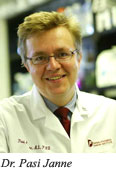
Treating Lung Cancer in Nonsmokers and Former Light Smokers
Name of the Trial
Phase II Randomized Study of Erlotinib with or without Carboplatin and Paclitaxel in Patients with Chemotherapy-Naïve Select Stage IIIB or Stage IV Non-Small-Cell Lung Cancer (CALGB-30406). See the protocol summary at http://cancer.gov/clinicaltrials/CALGB-30406.
 Principal Investigators Principal Investigators
Dr. Pasi Janne and Dr. Vincent Miller, Cancer and Leukemia Group B
Why This Trial Is Important
The drug erlotinib (Tarceva) is approved to treat non-small-cell lung cancer (NSCLC) that has not responded to chemotherapy (that is, as second-line therapy). However, the patients who benefited the most from erlotinib in the trial that led to its approval were those who had never smoked. Subsequent research has shown that "never smokers" have improved outcomes when treated with erlotinib because their cancers have specific mutations in a protein called epidermal growth factor receptor (EGFR), which is the target of erlotinib. In the presence of such mutations, erlotinib is particularly effective. It is important for the management of these patients, however, to compare the benefits of erlotinib alone or in combination with chemotherapy in first-line treatment.
In this trial, previously untreated NSCLC patients who never smoked or are former light smokers will be treated with either erlotinib alone or erlotinib in combination with the drugs carboplatin and paclitaxel.
"Lung cancer in nonsmokers is really a different disease than lung cancer in smokers," said Dr. Janne. "Nonsmokers are much more likely to have activating mutations in EGFR, and erlotinib seems to be effective in patients with such mutations.
"We hope to show that erlotinib, either given alone or in combination with chemotherapy, is useful as a first-line therapy for these patients," Dr. Janne commented.
Who Can Join This Trial
Researchers will enroll 180 patients with select stage IIIB or stage IV NSCLC who are either nonsmokers or former light smokers and have not received prior chemotherapy. See the list of eligibility criteria at http://cancer.gov/clinicaltrials/CALGB-30406.
Study Sites and Contact Information
Study sites in the United States are recruiting patients for this trial. See the list of study contacts at http://cancer.gov/clinicaltrials/CALGB-30406 or call NCI's Cancer Information Service at 1-800-4-CANCER (1-800-422-6237) for more information. The toll-free call is confidential.
An archive of "Featured Clinical Trial" columns is available at http://cancer.gov/clinicaltrials/ft-all-featured-trials. |